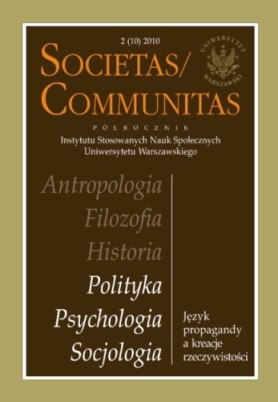Od Buzka do Tuska. Opowieści o Polsce
From Buzek to Tusk. Stories about Poland
Author(s): Jacek WasilewskiSubject(s): Social Sciences
Published by: Instytut Stosowanych Nauk Społecznych Uniwersytetu Warszawskiego
Summary/Abstract: Exposés contain certain narrative structures used by the Prime Ministers in their narrations on Poland. This article reconstructs them and describes the relations which link them with the image of Poland as a brand publicly presented by the Prime Ministers. The reconstruction of the narratives includes a three–level analysis: firstly, the Prime Minister’s presentation of his aims and means as a description of the government’s vision and mission; secondly, the description of the community and the identity of the audience; and thirdly, the structure of the narrative on Poland. Repairing Poland has been the mission of the vast majority of the governments. This concerns not just the economy, but also the overall decay and moral disorder. The vision has been to introduce Poland to the Western structures. Consecutive thresholds are set, and after they are reached everything will be fine: Poland will become a valued and recognized member of the West. Another type of vision is one about building a house for all. There is only space for the community, not for individuals. Moreover, you build for the community – rather distant in time – than for yourself. In most of the cases in his exposé the Prime Minister presents a narrative which includes a hero—the Prime Minister who will repair Poland (or defend her). Within the narrative Poland is a subject which, thanks to the Prime Minister’s efforts (his mission) will change its status. When the Prime Minister’s vision becomes reality Poland will become, alongside the Poles or the grandchildren, the beneficiary of his actions. This narrative can by analyzed using Greimas’s model which includes the functions of the hero (pointed out by Propp) in a magical fairy tale. On the other hand, you can look at the Prime Ministers’ exposé narratives from the point of view of Poland as the hero. Poland which will by introduced, repaired and transformed. We find a repair–type narrative, a narrative about a company and a narrative about a house. The latter describes Poland’s changing of status. We are faced with a narrative about Cinderella who will come to the European ball. It is also a narrative about a princess freed from the hands of the dragon; when this is achieved she will finally be free. In both cases Poland is a victim, either of fate, or of her enemies. The presented stories on Poland are an amalgam of our complexes, dreams, aspirations, but also a sign of the times. One can ask if using this type of story can lead to effective management of Poland as a brand.
Journal: Societas/Communitas
- Issue Year: 2010
- Issue No: 10 (2)
- Page Range: 179-212
- Page Count: 33
- Language: Polish

